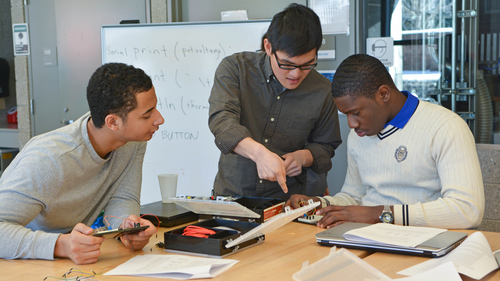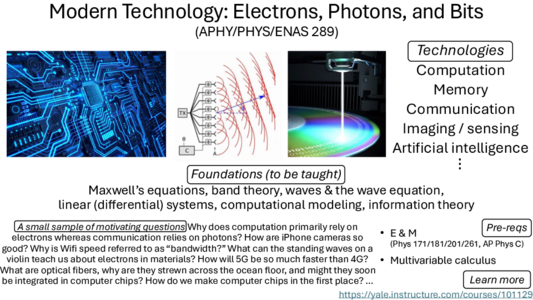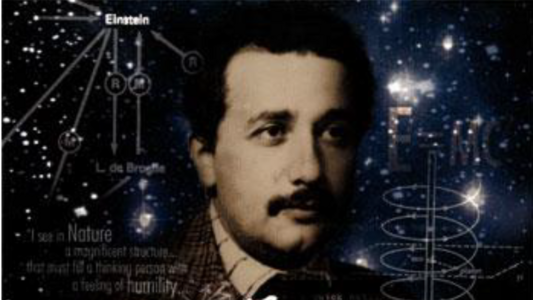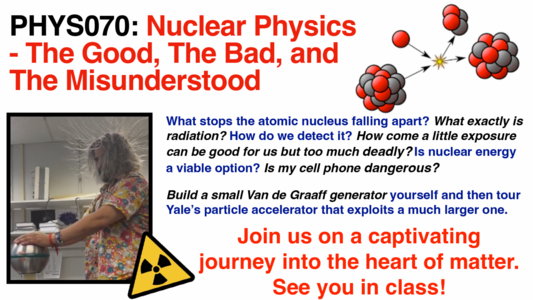
Yale Physics introduces two new advanced elective courses for Fall 2024: PHYS 289 Modern Technology: Electrons, Photons, and Bits, taught by Owen Miller and PHYS 293 Einstein and the Birth of Modern Physics, taught by Douglas Stone. In addition to these new courses, we will be offering two new first year seminars, PHYS 060 What’s the Universe made of? From Quarks to the Cosmos, instructed by Charles Baltay and PHYS 070 Nuclear Physics: The Good, The Bad, and the Misunderstood, taught by Helen Caines. Full course descriptions are below.
New Advanced Elective: PHYS 289 - Modern Technology: Electrons, Photons, and Bits
 The idea of the course is to give students a wide-ranging tour of modern technologies (cell phones, information storage, communication, power generation & distribution, a bit of AI) through the lens of foundational ideas in physics. This is a complement to more specialized (but more narrow) conventional courses, and can be used as a springboard into higher-level undergraduate and graduate courses.
The idea of the course is to give students a wide-ranging tour of modern technologies (cell phones, information storage, communication, power generation & distribution, a bit of AI) through the lens of foundational ideas in physics. This is a complement to more specialized (but more narrow) conventional courses, and can be used as a springboard into higher-level undergraduate and graduate courses.
Instructor: Owen Miller
Meeting days/times: Tuesdays & Thursdays, 2:30pm-3:45pm
Room: ML 107
New Advanced Elective: PHYS 293 - Einstein and the Birth of Modern Physics
 “Einstein and the Birth of Modern Physics” is a unique course in the physics curriculum in that it does not teach a sub-discipline of physics or a specific topic analyzed using physics. Instead it attempts to give students an overview of modern physics and its origins through historical developments centering on the works of Albert Einstein (and also including others such as Maxwell, Planck, and Bohr). The focus is on understanding the new concepts introduced at the beginning of the 20th century in their historical context, across thermodynamics, electromagnetism, Relativity theory and Quantum theory. A reasonable level of technical mastery of relevant physics is necessary to understand the various breakthroughs and paradigm shifts and will be taught in the course. Teaching will be in seminar format, but with some mixture of lecturing, discussion, and interspersing of history and biography, in service of understanding the nature of scientific discovery and its philosophical underpinnings. The aim is to give students both basic scientific understanding of fascinating topics like time dilation, mass-energy equivalence, gravitational warping of time and space, and quantum emission of light, as well as a sense how we got to where we are in modern physics.
“Einstein and the Birth of Modern Physics” is a unique course in the physics curriculum in that it does not teach a sub-discipline of physics or a specific topic analyzed using physics. Instead it attempts to give students an overview of modern physics and its origins through historical developments centering on the works of Albert Einstein (and also including others such as Maxwell, Planck, and Bohr). The focus is on understanding the new concepts introduced at the beginning of the 20th century in their historical context, across thermodynamics, electromagnetism, Relativity theory and Quantum theory. A reasonable level of technical mastery of relevant physics is necessary to understand the various breakthroughs and paradigm shifts and will be taught in the course. Teaching will be in seminar format, but with some mixture of lecturing, discussion, and interspersing of history and biography, in service of understanding the nature of scientific discovery and its philosophical underpinnings. The aim is to give students both basic scientific understanding of fascinating topics like time dilation, mass-energy equivalence, gravitational warping of time and space, and quantum emission of light, as well as a sense how we got to where we are in modern physics.
Instructor: A. Douglas Stone
Meeting days/times: Tuesdays & Thursdays, 1:00pm-2:15pm
Room: BCT 508A
New Course: PHYS 060 - What’s the Universe made of? From Quarks to the Cosmos
 A seminar course for First-Year students. The course will develop the hierarchy of nature in how the tiniest basic constituents, the quarks and leptons, combine to form atoms which are the core of all matter we are familiar with, and future power sources such as atomic and nuclear energy. Will then pursue how this matter we are familiar with further combine to form planets, stars, black holes and galaxies, and discuss the present state of progress of cosmology, where much of the effort of modern Physics and Astronomy research is concentrated. Quantum Mechanics and Einsteins Relativity will be introduced as needed.
A seminar course for First-Year students. The course will develop the hierarchy of nature in how the tiniest basic constituents, the quarks and leptons, combine to form atoms which are the core of all matter we are familiar with, and future power sources such as atomic and nuclear energy. Will then pursue how this matter we are familiar with further combine to form planets, stars, black holes and galaxies, and discuss the present state of progress of cosmology, where much of the effort of modern Physics and Astronomy research is concentrated. Quantum Mechanics and Einsteins Relativity will be introduced as needed.
The level of discussion will be mostly qualitative and will not require any previous knowledge of physics or advanced math. The course will consist of some weekly readings, a midterm quiz, and final reports at the end of the semester.
Instructor: Charles Baltay
Meeting days/times: Tuesday & Thursday - 2:30p.m. - 3:45pm
Room: WL 216
New Course: PHYS 070 - Nuclear Physics: The Good, The Bad, and The Misunderstood
 This new first year seminar course gives a fascinating peak into the subatomic world. What stops the atomic nucleus falling apart? What exactly is radiation? How do we detect it? How come a little exposure can be good for us but too much deadly? Is nuclear energy a viable option? Is my cell phone dangerous? Should I get that x-ray at the dentist? All these questions and more will be discussed.
This new first year seminar course gives a fascinating peak into the subatomic world. What stops the atomic nucleus falling apart? What exactly is radiation? How do we detect it? How come a little exposure can be good for us but too much deadly? Is nuclear energy a viable option? Is my cell phone dangerous? Should I get that x-ray at the dentist? All these questions and more will be discussed.
The small class size is ideal for encouraging discussions, especially towards the end of the semester when we will be applying the fundamental principles covered earlier in the course to understanding how nuclear radiation has been used (and abused) in medical settings, as a power source and in warfare.
You will also have the opportunity to construct a small Van de Graaff generator , tour Yale’s particle accelerator that exploits a much larger one and visit the Wright Lab to learn about the cutting edge nuclear research being performed there.
We start with the basics, so while a high-school physics course will be useful, it is not required.
Instructor: Helen Caines
Meeting days/times: Tuesdays & Thursdays, 9:00am-10:15am
Room: SPL 51